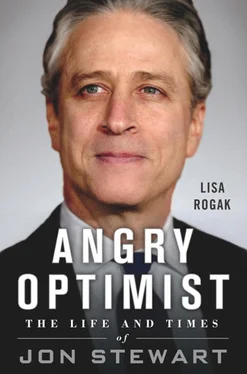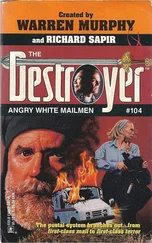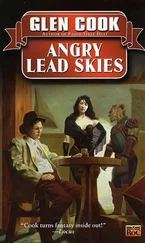“It was impossible to get an interview with John Kerry at the time,” said Tucker Carlson, the former host of the CNN show Crossfire . Once Stewart landed the interview, he disappointed many viewers. “He asked him questions like, ‘Why are people so mean to you? How did you get so great? What is your vision for America?’ It’s a Nerf interview.”
Even though he was quick to point out that he’s not a journalist for perhaps the thousandth time since The Daily Show began, the criticism shocked Stewart. He scrutinized his own behavior and soon launched an about-face campaign of his own to resurrect his reputation. Never one to shy away from pointing fingers at the news media and politicians at large, the old version of Stewart came out, and he ramped up his attacks across the board.
Though critics and reviewers had accused Stewart of producing and hosting an ultraliberal show from the first week he took over, Stewart maintained that he was an equal opportunity comedian when it came to poking fun at the different political parties. A team of Pew researchers combed through every show aired in the second half of 2007 and found that “Stewart’s humor targeted Republicans more than three times as often as Democrats. The Bush administration alone was the focus of 22 percent of the segments.”
However, Pew concluded that things weren’t as unbalanced as they seemed. “The fact that more jokes are made about conservatives and Republicans is largely a function that the Republicans hold the White House and have been in power for the last seven years,” observed David Hinckley, critic-at-large for the New York Daily News . “Bush is Christmas, Hanukah, and New Year’s all rolled into one. Among comedians and satirists, Bush is a gold mine.”
Colbert agrees, though he adds that Stewart cares less about the political leanings of a potential target than the intent. “Jon is admirably balanced,” he said. “He pursues the true intention of the person speaking, left or right [in order] to be able to honestly mock.”
“What we go after are not actual policies but the façade behind them,” said Stewart. “We work in the area between the makeup they’re wearing and the real face. And in that space, you can pretty much hammer away at anybody.”
However, at the same time, head writer Steve Bodow was looking forward to taking the show in a new direction in 2007. “[We’ve enjoyed] many, many, many comedic opportunities from George Bush, but we’re very glad to see him go, politically and also comedically,” he said. “We’ve really been working with and on him for all this time, but let’s get some new material and some new challenges.”
And so this could be part of the reason why Stewart started to go after Kerry that same year; in 2007 the Bush presidency was in its waning days, and Stewart and his team might have to start to gear up to learn how to make fun of a Democratic president. He started to turn the tables by appearing on Larry King Live to criticize John Kerry. “If anyone has ever been raised in a laboratory to become president, it’s Kerry,” he said. “From the age of three, he got his ‘My First White House’ kit. Now that he’s finally in the race to be president, he has decided [to be] a likable average Joe, and it so clearly goes against his constitution.
“All [politicians] run to this weird sense of ‘I’m going to put on that red-and-black-check jacket and I’m going to go down to a factory and have a cup of coffee and a doughnut with a dude and show him that I’m an idiot.’”
He also quickly squashed rumors that he might enter politics himself.
Despite his about-face on Kerry, politicians continued to flock to the Show, equating an appearance with an instantaneous rise in visibility and name recognition among younger Americans. In the fall of 2004, John Edwards, former President Clinton, Pat Buchanan, and John McCain all appeared on the show, though Stewart’s line of questioning remained a bit less confrontational with them than some would have liked.
Besides, Stewart still didn’t think of himself as particularly political. “People confuse political interest with interest in current events,” he pointed out. “The political industry is devoted to the electing and un-electing of officials, and that can be corrosive. If the Republicans don’t lose either house, people will talk about Karl Rove’s genius. There’s no genius. It will be the triumph of machine and money and strategy over reality. I don’t think that’s anything to honor or enjoy.”
The political campaign industry is also focused on manipulating the media, and Stewart reserved special vitriol for those reporters and anchors who allowed it to happen, further ramping up his well-worn attacks on the media.
“They’ve all become part of the same organism and no longer see themselves as the other, ” he continued. “Journalists have become stars, and their stardom is about who they can get, and by getting the right person they can keep advancing. The paradigm has switched.”
He summed up his perspective this way. “There’s a difference between making a point and having an agenda,” Stewart said. “We don’t have an agenda to change the political system. We have a more selfish agenda, to entertain ourselves. We feel a frustration with the way politics are handled and the way politics are handled within the media.”
He also changed his tone about the show, softening his take a bit in a subtle way. “It’s not fake news,” he added. “We are not newsmen, but it’s jokes about real news. We don’t make anything up, other than the fact we’re not actually standing in Baghdad. The appeal of doing the show is that it’s cathartic.”
Some may have been surprised by the change, but there may have been a good reason behind it: Stewart was now a father. Nathan Thomas Stewart was born on July 3, 2004—Jon and Tracey named him after Stewart’s grandfather. Almost from the beginning they called him Little Man.
He now had the chance to prove that he was a better father than the one who had deserted him.
* * *
He barely had time to adjust to life as a new father before a series of events in the fall of 2004 raised his profile along with his workload.
In the wake of the conventions—indeed, even while they were still going on— The Daily Show got noticed in a big way. Even though ratings and reviews were both growing, the buzz was getting even louder: on September 19, 2004, right in the middle of the election coverage, The Daily Show won two Emmy Awards for Outstanding Writing for a Variety, Music or Comedy Program as well as for Outstanding Variety, Music, or Comedy Series.
Approximately 1.1 million people viewed each episode of The Daily Show, an increase of 20 percent for 2004 alone. But what was even more satisfying was that the show achieved a 0.74 rating for the third quarter; The O’Reilly Factor was just slightly ahead at 0.76.
Best of all, in the first nine months of 2004, Comedy Central added fifty new advertisers. “ The Daily Show is a good piece of that,” said Hank Close, Comedy Central executive vice-president of advertising sales. “It’s a very, very strong driver of our revenue.”
“It’s an advertisers’ sweet spot,” said Brad Adgate, senior vice-president of corporate research at Horizon Media. “Young people are the least likely to read a newspaper or watch TV news, and The Daily Show is one show that really has found a niche.”
When some TV shows become successful, occasionally advertisers will request that the producers clamp down on including anything in the show that could be viewed as controversial or negative toward the product. While former Daily Show correspondent Bob Wiltfong had seen that this was often the case in his days spent in traditional TV news, he said he never saw any signs of this happening at The Daily Show . “The show was so successful, they didn’t dare touch it,” he said. “As a former TV correspondent, I felt like there was less concern about what advertisers thought while we were in the editing room or writing, and there was never any talk of whether Comedy Central would lose advertising revenue if we made this joke. ‘Do we need to take off the gloves with this guy but not with that guy because of his connections with Viacom?’ No, that never happened, while when I was working on a real TV news show, it did occasionally come up: ‘Run this, and we’ll lose this advertiser.’ But never at The Daily Show, and I was surprised. I thought, this is the way real journalism should be.”
Читать дальше












